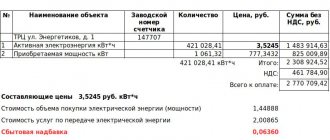On July 10, the Constitutional Court of the Russian Federation issued a resolution that changed the approach to calculating fees for heat supply in an apartment building: you can pay for heating according to meter readings regardless of whether there are individual meters in all rooms of the house. But, of course, there are nuances. Find out how the utility contractor can now charge fees for heat supply to apartment buildings.
Supreme Court of the Russian Federation on debt collection under a heat supply agreement
201351
The apartment building is connected to a centralized heating system
An agreement was concluded between an individual entrepreneur and the heat supply contractor for non-residential premises in an apartment building. The house was connected to a centralized heating system.
The owner shut off the radiators in the room without dismantling them and insulated the risers by connecting alternative heat sources. After that, he stopped paying the utility provider, because, in his opinion, he no longer received the service. The written agreement with RSO had expired by that time.
However, the resource supplying organization continued to send certificates of completion to the owner and issue invoices for payment for the supplied resource. All claims sent to the consumer in connection with the growing debt remained unanswered.
The service provider filed a lawsuit demanding to collect 250 thousand rubles of debt and penalties from the entrepreneur. The owner did not agree with the RSO requirement for several reasons:
- The resource supply contract has expired.
- The radiators in the room are closed, the service is not provided, an autonomous heating system has been installed.
- No one lives in the premises, it is not used for business activities, therefore, the owner does not have to pay for utilities as an individual entrepreneur, and if there are no residents in the premises, the payment must be recalculated.
The legal dispute went through all possible authorities, and the Supreme Court of the Russian Federation put an end to it (case No. A51-5866/2018). Let us consider the arguments of the courts, which were unanimous in their decisions.
Why did the Constitutional Court of the Russian Federation demand a review of the heating billing system?
297369
The heat supply agreement with RSO is concluded in writing or through implied actions
The court of first instance, when considering the claim, examined each of the arguments of the owner, which he brought in his defense, asking to dismiss the RSO claim.
The judge indicated that resource supply agreements in non-residential premises must always be concluded directly between the owner and the resource supply organization (clause 6 of RF PP No. 354).
They can be concluded in writing or by the consumer performing implicit actions - indicating his intention to consume utility services or the actual consumption of such services.
The obligation to pay for the supplied heat energy arose with the entrepreneur due to the fact of consumption of heat energy, regardless of the presence or absence of a corresponding agreement in writing (Articles 539, 544 of the Civil Code of the Russian Federation).
The fact of delivery of thermal energy by the contractor to the non-residential premises of the defendant is confirmed by invoices, certificates of work performed, and an act of connecting the premises to the heat supply system.
Consequently, even in the absence of a written agreement with the utility service provider, the consumer is obliged to pay for thermal energy.
How to take into account legal requirements when paying for heating
323616
Disabling radiators and installing autonomous heating must be approved by the local self-government body
The court also did not confirm the owner’s argument that he did not consume thermal energy because he disconnected the premises from the centralized heating system of the apartment building. Autonomous heating equipment is installed in non-residential premises.
In accordance with paragraphs. “c” clause 35 of RF PP No. 354, the consumer does not have the right to dismantle or turn off heating elements without permission, or to regulate the indoor heating system equipment. These actions can lead to a decrease in air temperature in all areas of the house and an increase in the consumption of utility resources.
According to clause 1.7.1 of Rules No. 170, the conversion of residential and non-residential premises into apartment buildings is allowed only after obtaining the appropriate permits from the municipality. The completion of such reconstruction is confirmed by an act of the acceptance committee (Part 1 of Article 28 of the Housing Code of the Russian Federation).
The court referred to the resolution of the Constitutional Court of the Russian Federation dated July 10, 2018 No. 30-P, which states that the MKD is an integral system. Therefore, the owner of the premises cannot completely refuse to pay for heating services to the house, including common areas that are part of the common property of the house.
The owner of the non-residential premises did not provide the court with evidence that the insulation of the risers in the premises, the disconnection of radiators and the installation of autonomous heating equipment were carried out with the receipt of permits, and the premises were completely disconnected from the heat supply of the house. Therefore, he cannot be exempted from paying for the supplied heat energy.
How the payment for heat supply was calculated before the decision of the Constitutional Court of the Russian Federation
In accordance with clause 80 of the Decree of the Government of the Russian Federation dated May 6, 2011 No. 354, the volume of resource consumed must be recorded by individual metering devices (IMU) and common house (collective) metering devices (ODPU).
From January 1, 2012, IPU and ODPU for thermal energy must be installed in new apartment buildings, and in apartment buildings after major repairs - if technically possible (Part 7, Article 13 of Federal Law No. 261-FZ of November 23, 2009).
Consumers are required to pay for the actually accepted volume of utility resources according to the meter data. If the IPU is not established, then payment is made based on the consumption standard for the utility resource (Article 544 of the Civil Code of the Russian Federation and Part 1 of Article 157 of the Housing Code of the Russian Federation).
According to clause 42(1) of the Russian Federation Regulations dated 05/06/2011 No. 354, the payment for utility services for heat supply, depending on the availability of metering devices, is calculated in three ways:
- if IPU and ODPU are not established - based on consumption standards;
- if there is an ODPU, but the IPU is not installed in all premises of the apartment building - based on the readings of the general building meter in proportion to the area of each room;
- if there is ODPU and IPU in all residential and non-residential premises of the house - according to indications.
To make calculations based on meter readings, 100% of the premises in the apartment building must be equipped with them, and all IPUs must be in working order. According to clause 42(1) of the Russian Federation PP No. 354, if at least one room in an apartment building is not equipped with an individual heat meter, then the readings of other heat metering devices installed in the premises of the house are not accepted for calculations. Payment is calculated based on the readings of a common house meter in proportion to the area of the premises occupied by the consumer (paragraph 3, clause 42(1) and formulas 3, 3(1), 3(2) of Appendix No. 2 to RF PP No. 354).
Commercial heat metering
137170
Recalculation for heating in the temporary absence of a consumer is not made
At the first instance, the owner's arguments were considered in detail that there is no business activity on the premises, therefore, the payment should be calculated according to tariffs for individuals. In addition, as the consumer argued, no one uses the premises, which means that RSO must recalculate the fee in case of temporary absence.
The court did not accept these arguments of the defendant, because:
- The consumer is registered as an individual entrepreneur and has not provided evidence of loss of this status.
- The defendant did not provide evidence that the non-residential premises are used for personal and/or domestic purposes, therefore, the calculation of heating fees cannot be made according to tariffs for the population.
- As follows from clause 86 of RF PP No. 354, the amount of heating fees is not recalculated in the event of a consumer’s temporary absence from a residential premises.
- Non-use of premises in an apartment building is not grounds for exemption from the obligation to pay for utilities for heat supply (clause 37 of the Resolution of the Plenum of the Armed Forces of the Russian Federation dated June 27, 2017 No. 22).
Have the formulas for calculating heating fees changed: a lawyer explains
5941035
How the case of calculating heating fees ended up in the Constitutional Court of the Russian Federation
Sergei Deminets, who lives in a 17-story apartment building built in 2015, decided to challenge this approach to calculating fees for heat supply.
All premises in the apartment building were equipped with general and individual heat energy metering devices. The fee for CG was calculated in accordance with paragraph. 4 clause 42(1) of the RF PP No. 354 - according to the testimony of the IPU and ODPU.
But in 2021, some owners of premises in the house refused to meter heat energy by dismantling the meters. The company managing the house did not take into account the testimony of the IPU of the residents of the house, who kept them in working order. The heating fee was calculated by distributing the entire volume of the resource recorded by the ODPU, according to paragraph. 3 clause 42(1) RF PP No. 354.
Payments for heat supply have increased. The owner considered that such an approach to calculations infringes on the rights of careful consumers, making them dependent on the will of their neighbors, and does not allow saving energy resources. He went to court.
The decision of the court of first instance was in favor of the management company: the court refused to recalculate the plaintiff, citing clause 42(1) of the RF PP No. 354. This decision was also supported by the regional court of appeal.
To challenge clause 42 (1) of the RF PP No. 354, on which the courts relied when making decisions, the owner appealed to the Supreme Court of the Russian Federation. He insisted that this clause of the legislative act allows residents of apartment buildings who have not kept their meters to illegally enrich themselves at the expense of their neighbors, wasting heat uncontrollably. But the RF Supreme Court refused to satisfy the claim. This decision was supported by the Appeals Board of the RF Armed Forces. The consumer filed a cassation appeal, but the court rejected it three times.
What to do if RSO supplies an inflated amount of thermal energy
111371
The consumer may be exempt from paying for indoor heating if the radiators are legally dismantled
An important circumstance in the court case was also that the radiators in the room were not dismantled: they were only blocked off. This did not allow the owner to appeal to the legal position of the RF Armed Forces, set out in the ruling dated August 30, 2016 No. 71-KG16-12.
In this determination, the Supreme Court of the Russian Federation noted that the fact that networks pass through a non-residential premises in the absence of heat-receiving devices does not provide grounds for collecting heating fees from the owner. Since the heating radiators were not dismantled in the premises of the individual entrepreneur, the court of first instance did not take into account the reference to determination No. 71-KG16-12.
Having examined each argument of the owner, the court came to the conclusion that the contractor has the right to recover from the consumer the entire amount of debt and penalties for late payments.
What is more profitable: paying for heat by device or by standard?
It is important for home owners to understand how much thermal energy they consume for which they pay. To do this, it is enough to install devices for calculating heat consumption. But the flow meter itself will not save anything.
The operation of heating networks is controlled centrally. The temperature of the water is regulated where it is heated. But at thermal power plants this process takes a lot of time. In-house central heating systems can receive excess heat. It happens that in April it’s +15 degrees outside, but you can’t touch the batteries with your hand. In order to save heating energy, it is necessary to install an automated heating unit. In addition to the counting function, such a unit regulates the heat supply, preventing excess heating in the spring or insufficient heating in the winter.
The second stage of the controlled consumption technology will be the installation of apartment-by-apartment (individual) heat meters. Heating radiators must be installed with the ability to change the heating parameters of the room, at the request of the home owner. The heating unit will react accordingly to changes in battery regulation parameters.
The amount of payment for heating is the most significant line in the receipts for housing and communal services that are received by the owners of apartment buildings. Saving on heating is very problematic. This is explained by the recording system and calculation of payment for consumed heat.
Changes to the heat supply system must be approved by the local self-government body and included in the technical documentation
By filing an appeal, the owner of the premises tried to prove that the heating system in his premises was rebuilt in accordance with the procedure established by law.
He indicated that the heating radiators were closed by the organization managing the house and seals were installed, and the pipelines were insulated, and ventilation with a heater was installed in the room as an alternative to the centralized heating system. Consequently, the district heating service was not provided to him.
The Court of Appeal, considering the complaint, noted that the house in which the defendant’s non-residential premises are located has a single building-wide heating system. The owner of the premises did not provide evidence that his premises are structurally located separately from the multi-apartment residential building and do not have common engineering systems with those in the building or have a separate insulated thermal input.
The consumer does not have the right to arbitrarily dismantle or turn off the heating elements provided for in the technical documentation of the house, or make changes to the in-house engineering systems (clause 35 of RF PP No. 354).
Any intervention in the general building engineering networks requires an agreed project and changes to the technical documentation of the house. According to Part 1 of Art. 26 of the Housing Code of the Russian Federation, the reconstruction is carried out in compliance with the requirements of the law in agreement with the local government body.
When heating radiators are disconnected in the premises, the placement of which is provided for in the technical documentation, the consumer may be exempt from paying for heat supply services only under one condition: if he provides evidence that this was done in compliance with the approval procedures with local self-government bodies. The approval of the management organization or the acts of other specialists does not matter.
The Court of Appeal upheld the first instance decision. The Court of Cassation confirmed this position, and the Supreme Court of the Russian Federation did not consider the complaint, agreeing with its colleagues.
On a note
The issue of charging for heating in the premises of owners in apartment buildings has received a lot of attention since December 2021, when the Constitutional Court of the Russian Federation, in Resolution No. 46-P dated December 20, 2018, established that consumers with individual sources of thermal energy must pay only for the resource consumed for the purpose of maintaining common property.
However, the same resolution No. 46-P states that this applies only to those owners in whose premises the reconstruction of the heat supply system was carried out with the receipt of all permits. At the same time, all owners of premises in the house pay for the resource consumed to maintain the common property.
The case discussed above precisely implements the requirements voiced by the Constitutional Court of the Russian Federation that without registering the reconstruction in the manner prescribed by law, the owner is obliged to pay for centralized heat supply in full, even when installing autonomous equipment.
The Constitutional Court explained how to pay for heating entrances in residential buildings
The Constitutional Court ordered the government to amend the current rules for the provision of public services to owners and users of premises in apartment buildings and residential buildings in conjunction with one of the formulas in the annex to the rules, since they do not comply with the Basic Law. The Constitutional Court adopted this decision after studying the complaint of a resident of the Stavropol Territory, Valentina Shesterikova, the press service of the court reported.
A woman lives in the city of Mikhailovsk in an apartment building connected to a centralized heating supply. At the same time, most of the rooms in the house are heated autonomously - by gas boilers. Since 2018, apartment owners began to receive receipts for payment for heating common areas, although this service is not actually provided. This was confirmed by construction and technical expertise: there are no radiators or even heating risers in the premises. But the courts found that such “autonomous” owners cannot be exempted from paying for utilities provided for general house needs.
- The Ministry of Construction denied data on the linking of heating tariffs to the number of floors
June 20, 15:51 - The State Duma approved a bill on calculating the cost of heating
May 15, 13:08 - The government is changing the procedure for calculating the cost of heating
January 9, 12:57
When considering the case, the Constitutional Court recalled that it had already pointed out the obligation to differentiate payments for heating individual premises and for general house needs, and again noted that common house heat must be paid even by the owners and users of premises with individual sources of thermal energy.
But if the vast majority of rooms in the house are switched to autonomous heating, then common areas will be heated mainly due to heat transfer from individually heated rooms. Their residents, having initially invested in an autonomous heating system and regularly allocated funds for its maintenance, thereby incur the costs of heating the house as a single building. The current procedure for calculating heating fees does not take this circumstance into account.
The Constitutional Court believes that the government should create a mechanism for calculating payments for owners and those who use centralized heating so that the actual participation of each of them in the indirect heating of common areas is taken into account. Now, owners of gas boilers, including the applicant, are forced to incur additional costs when paying for heating.
The case of Valentina Shesterikova is not subject to revision, since it is impossible to recalculate payments for heat already supplied in the absence of a special calculation mechanism. But after changes are made to the legal regulation, the applicant is due compensation, the form and amount of which must be determined by the court hearing her case, the Constitutional Court decided.
- Pravo.ru









